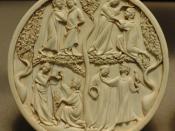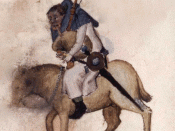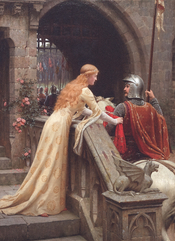During the medieval period, several aspects of modern society were non-existent. Mercifulness, humility, and consideration, just to name a few, in several aspects life didn't exist. The question of morality is seemingly always a point of major discussion when the medieval period is brought into consideration. The Miller's Tale in The Canterbury Tales is a work that has always wrestled with the question of morality. The question is even more of a problem for those who believe in the courtly love tradition.
The biggest threat to both contemporary and antecedent morality is adultery. Anyone who has read The Miller's Tale can see that adultery is one of the centrifugal themes of the story. The miller clearly states in the begin of the tale, that John and Alisoun were married, yet all it takes is a few sweet words and tears from Nicholas, and- she just like that, commits one of the worst crimes against morality.
Lines 184-189 read:
"And spak so faire, and proofed him so faste,
That she hir love him granted ate laste,...
'Myn housebounde is so ful of jalousye
That but ye waite wel been privee
I woot right wel I nam but deed' quod she. "
Not only does she agree to have sex with him, she also offers to be discreet to keep her husband from knowing. This is just one of the many examples of the many crimes against humanity, even though humanity in this case is John. The infidelities and other immoralities are masked by humorous the ending. Therefore to answer the question is there a moral to The Miller's Tale, is no. Unless of course, you accept this simple paradox as a moral: during medieval times immorality is sociably acceptable as long as it's funny.
On the other hand, those who...



Hmmmm...
But surely Alisoun is the only one in the tale who goes completely unpunished at the end? So it would seem the moral isn't not to commit adultery? Nicholas, Absolon and John all get punished in the end, by being branded, humiliated and being made a cuckold repectively. It would seem Alisoun is the only one getting away scot free. The main sins being commented on, to me, were jealousy, adultery (but only on Nicholas's part) and falsity (immorality for a parish clerk).
1 out of 4 people found this comment useful.